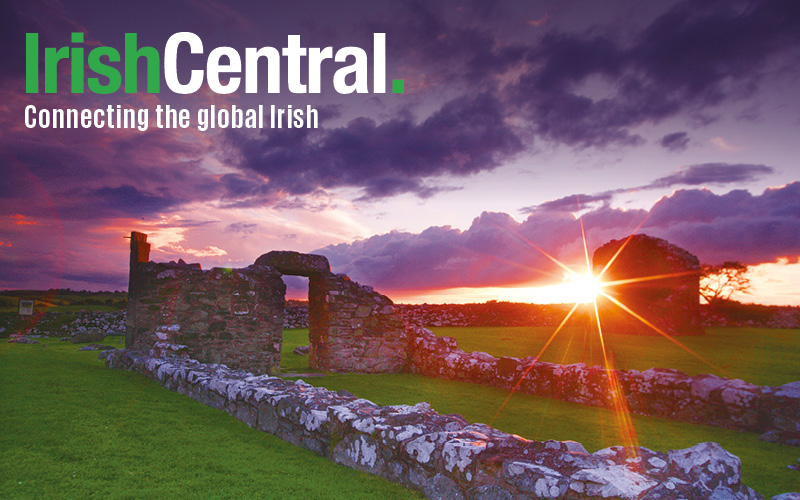Dr. Nancy J. Sullivan may be the one person in the world who can stop Ebola.
She is the National Institutes of Health (NIH) researcher who experts say has the best chance of stopping the deadly disease through her vaccine.
On Friday, Doctors Without Borders said "this could be the tipping point," referring to Sullivan’s vaccine which has now begun clinical trials.
Massachusetts Irish and the granddaughter of Irish emigrant domestic servants, Dr. Sullivan spent eight weeks backpacking around Ireland in 1997 after finishing graduate school. It was a chance to draw breath, she told the Irish Voice, and to visit the land of her grandparents who came from Cork and Kerry.
She remains close to Ireland. Her niece just graduated veterinary school at University College Dublin.
Sullivan grew up in Quincy, MA and attended a small Catholic school called Merrimack where her passion for science and research was first kindled. Then it was on to Harvard and eventually a doctorate dealing with infectious diseases.
It was also around the time she decided to focus on research work and pick a specialty that would be different to her post graduate work with HIV.
Sullivan decided to pick an obscure disease called Ebola, discovered in Africa around 1976. “I sought out a virus not getting a lot of attention,” she said. “I picked Ebola.”
Dr. Nancy Sullivan developed the first Ebola vaccine effective in monkeys. Can it help humans? http://t.co/u8EZ6ZroCE pic.twitter.com/Hz4l0gPgKI
— Wall Street Journal (@WSJ) October 20, 2014
At the time it was a deadly disease but one that seemed to be contained in African countries where epidemics always seemed to flare out.
Sullivan says that was due to poor transportation systems which meant in the Congo, for instance, the disease was unable to travel far. In addition, international health groups helped clamp down on the local outbreaks before they got much farther.
But what would happen if the disease hit a more modernized county and those impacted were able to travel much more easily? Sullivan realized the stakes could be very high. By now she was a leading researcher at the NIH in Maryland, tasked with tackling killer diseases.
For many years looking for a vaccine was considered a waste of time as Ebola, named for the river in the Congo beside where it was first discovered, was such an efficient killer
All has changed because of Sullivan. The vaccine she created after launching her career studying Ebola is now considered the best chance to stop it.
The world is watching, something she deals with matter of factly. “I just do the science,” she says.
Others are not so understated.
The National Geographic reported that Dr. Sullivan’s vaccine is so “effective in monkeys that macaques can be protected or rescued even if they're injected with a hundred times the lethal dose of the Ebola virus after vaccination.”
In September, 10 healthy American volunteers were injected with Sullivan's vaccine.
GlaxoSmithKline PLC believes it could have one million doses of Sullivan’s vaccine available by 2015. It’s believed that her vaccine could act as a firewall against the epidemic.
What is different about Sullivan’s formula? She points out that vaccines which were developed using mice were not effective until she created one that works incredibly well in monkeys.
She explains that Ebola wraps itself around normal cells and the immune system does not recognize it. Vaccines that try and stimulate antibodies and immune response attacks do not work.
Her Ebola vaccine injects a harmless piece of the Ebola gene contained in a cold virus. The injection stimulates T cells, another of the body’s defense mechanisms, to attack, and they have proved highly successful in the monkeys in killing Ebola.
But will it be useful for humans? Sullivan says she is optimistic, but in her job she says failure of new methods is a constant reality and she has to retain optimism.
If a vaccine works health workers will be first to get it she thinks ensuring they can treat patients safely.
There is even a possibility that a version of the vaccine could stop Ebola in its tracks even when a person is infected. All that will be proven or not in the near future.
What is clear now is that Sullivan stands at an amazing moment in infectious disease history.
Her little known specialty has suddenly become the world's greatest medical need. If she develops the vaccine that successfully treats Ebola the sky will be the limit.
Such a development would clearly make Sullivan happy, but it is for the reasons of scientific inquiry not celebrity.
“I want it to work to save lives,” she says simply.




Comments